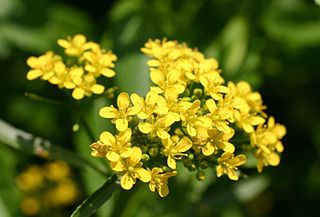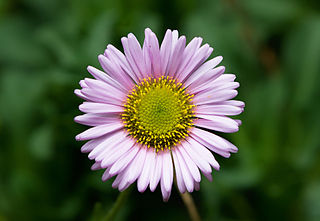
Saccharum is a genus of tall perennial plants of the broomsedge tribe within the grass family.

Artemisia is a large, diverse genus of plants with between 200 and 400 species belonging to the daisy family Asteraceae. Common names for various species in the genus include mugwort, wormwood, and sagebrush.

Ceanothus is a genus of about 50–60 species of nitrogen-fixing shrubs and small trees in the buckthorn family (Rhamnaceae). Common names for members of this genus are buckbrush, California lilac, soap bush, or just ceanothus. "Ceanothus" comes from Ancient Greek: κεάνωθος (keanōthos), which was applied by Theophrastus to an Old World plant believed to be Cirsium arvense.

Coreopsis is a genus of flowering plants in the family Asteraceae. Common names include calliopsis and tickseed, a name shared with various other plants.

Cardamine is a large genus of flowering plants in the mustard family, Brassicaceae, known as bittercresses and toothworts. It contains more than 200 species of annuals and perennials. Species in this genus can be found worldwide, except the Antarctic, in diverse habitats. The name Cardamine is derived from the Greek kardaminē, water cress, from kardamon, pepper grass.

Rorippa is a genus of flowering plants in the family Brassicaceae, native to Europe through central Asia, Africa, and North America. Rorippa species are annual to perennial herbs, usually with yellow flowers and a peppery flavour. They are known commonly as yellowcresses.

Inula is a genus of about 80 species of flowering plants in the family Asteraceae, native to Europe, Asia and Africa.

The Heliantheae are the third-largest tribe in the sunflower family (Asteraceae). With some 190 genera and nearly 2500 recognized species, only the tribes Senecioneae and Astereae are larger. The name is derived from the genus Helianthus, which is Greek for sun flower. Most genera and species are found in North America and South America. A few genera are pantropical.

The Gnaphalieae are a tribe of flowering plants in the family Asteraceae. It is most closely related to the tribes Anthemideae, Astereae, and Calenduleae.

Phoradendron is a genus of mistletoe, native to warm temperate and tropical regions of the Americas. The center of diversity is the Amazon rainforest. Phoradendron is the largest genus of mistletoe in the Americas, and possibly the largest genus of mistletoes in the world. Traditionally, the genus has been placed in the family Viscaceae, but recent genetic research acknowledged by the Angiosperm Phylogeny Group shows this family to be correctly placed within a larger circumscription of the sandalwood family, Santalaceae.

Astereae is a tribe of plants in the family Asteraceae that includes annuals, biennials, perennials, subshrubs, shrubs, and trees. They are found primarily in temperate regions of the world. Plants within the tribe are present nearly worldwide divided into over 250 genera and more than 3,100 species, making it the second-largest tribe in the family behind Senecioneae.

Chaerophyllum is a genus of flowering plant in the family Apiaceae, with 35 species native to Europe, Asia, North America, and northern Africa. It includes the cultivated root vegetable Chaerophyllum bulbosum.

Haplopappus is a genus of flowering plants in the family Asteraceae found in South America, mostly restricted to the dry regions of the Southern Andes, Chilean Matorral, and Patagonia.

Filago is a genus of plants in the sunflower family, native from Europe and northern Africa to Mongolia, Nepal, and Macaronesia. They are sometimes called cottonroses or cudweeds.

Anthemideae is a tribe of flowering plants in the family, Asteraceae, and the subfamily Asteroideae. They are distributed worldwide with concentrations in central Asia, the Mediterranean Basin, and southern Africa. Most species of plant known as chamomile belong to genera of this tribe.

Madieae is a tribe of flowering plants in the family Asteraceae. It is sometimes considered a subtribe of Heliantheae. Notable species include the tarweeds of the Western United States as well as the silverswords of Hawaii.

Euphrosyne is a genus of flowering plants in the family Asteraceae.

The tribe Millettieae, also known as the Wisteria tribe is one of the subdivisions of the plant family Fabaceae.
Spermolepis is a genus of flowering plants belonging to the family Apiaceae.

















